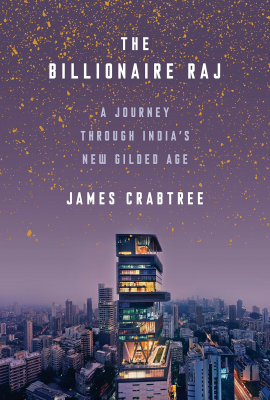Book: 'The Billionaire Raj' by James Crabtree

This highly readable book offers a vivid portrait of a particular section of modern Indian society: the extremely wealthy business elite. Crabtree describes their private opulence, greed and vulgar displays of tasteless wealth, rather than the public squalor associated with the sub-continent of old. His book also describes the increasing intolerance toward religious minorities, which includes India's 28 million Christians.
James Crabtree was the Financial Times's man in Mumbai for five years. He had many encounters with India's billionaire class who cashed in on their well-oiled political connections when 1991's economic reforms took effect. Tightly controlled state licensing gave way to crony capitalism, thanks to liberalisation, privatisation and a lack of regulatory integrity. State assets were sold off for a fraction of their value to people with good political contacts. Crabtree describes the scams and kickbacks, and the web of middlemen who facilitate dodgy deals, be it getting contracts to build sports stadia or cat passports. He also provides a glimpse into the world of $23 million weddings, supercars no one bothers to repair, and conspicuous excess.
This inevitably leads Crabtree to the corrupt political system in which no one can be a candidate for public office without the vast wealth needed to pay for party workers, advertising, rallies and entertainment. No wonder one in five members of Parliament in 2014 had "serious criminal records, ranging from kidnapping and racketeering to murder." Crabtree concludes that many voters perceive violence and extortion as signs of strength in a politician, indicating patronage networks that might one day benefit them.
The politicians and officials in Tamil Nadu take 10% of everything, Crabtree learns, but their behaviour is less selfish than the northern Indian politicians who plunder programmes for the poor. It seems no one ever acts in the common good. There is also a sense that nothing will ever change for the mass of Indians, living in rural poverty, because there is no political or bureaucratic will behind development initiatives.
Readers of Independent Catholic News may well be alarmed by the rise of violent and intolerant Hindu nationalism, stoked by the wildly popular prime minister, Narendra Modi. Crabtree describes the "growing drumbeat of alarming episodes involving Hindu chauvinists," such as removing Nehru's name from schoolbooks and writing the Mughals out of history. He observes that fanatical Hindu groups have become bolder since Modi's election, and while Modi speaks of religious tolerance when he makes speeches overseas, he does not reprimand his supporters when they destroy mosques and churches or murder religious leaders.
According to Aid to the Church in Need, hundreds of churches have been attacked in the last two years. Hindu militants prevent Christian villages getting access to subsidised food, nuns are raped and priests assaulted in growing numbers.
The book leaves one wanting to know more. However, the author's aim was to portray the billionaire class, rather than the Christian community, and the poor. Although much is written about India's growing middle class, only 5,000 people out of more than a billion Indians earn more than $15,500 a year, and only 1% earn enough to pay tax. Galbraith's words apply to India as much as they ever did: private affluence and public squalor.
'The Billionaire Raj' by James Crabtree, is published by One World Books, £18.99


















